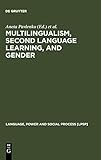Multilingualism, Second Language Learning, and Gender / ed. by Aneta Pavlenko, Adrian Blackledge, Ingrid Piller, Marya Teutsch-Dwyer.
Material type: TextSeries: Language, Power and Social Process [LPSP] ; 6Publisher: Berlin ; Boston : De Gruyter Mouton, [2011]Copyright date: ©2001Description: 1 online resource (356 p.)Content type:
TextSeries: Language, Power and Social Process [LPSP] ; 6Publisher: Berlin ; Boston : De Gruyter Mouton, [2011]Copyright date: ©2001Description: 1 online resource (356 p.)Content type: - 9783110170269
- 9783110889406
- 404/.2
- P115 .M83 2001
- online - DeGruyter
- Issued also in print.
| Item type | Current library | Call number | URL | Status | Notes | Barcode | |
|---|---|---|---|---|---|---|---|
 eBook
eBook
|
Biblioteca "Angelicum" Pont. Univ. S.Tommaso d'Aquino Nuvola online | online - DeGruyter (Browse shelf(Opens below)) | Online access | Not for loan (Accesso limitato) | Accesso per gli utenti autorizzati / Access for authorized users | (dgr)9783110889406 |
I-XII -- Introduction: Multilingualism, second language learning, and gender Ingrid -- 1. Gender, society, and ideology in multilingual settings -- New directions in the study of multilingualism, second language learning, and gender -- Complex positionings: Women negotiating identity and power in a minority urban setting -- Researching women’s language practices in multilingual workplaces -- Gendering the ‘learner’: Sexual harassment and second language acquisition -- 2. Negotiation and performance of gender in multilingual contexts -- “How am I to become a woman in an American vein?”: Transformations of gender performance in second language learning -- (Re)constructing masculinity in a new linguistic reality -- Linguistic intermarriage: Language choice and negotiation of identity -- Finding one’s voice in Japanese: A study of the pitch levels of L2 users -- 3. Gender in multilingual educational settings -- Gender and public space in a bilingual school -- Cross-cultural excursions: Foreign language study and feminist discourses of travel -- Self-expression, gender, and community: A Japanese feminist English class -- Name index -- Subject index
restricted access online access with authorization star
http://purl.org/coar/access_right/c_16ec
This volume presents a comprehensive introduction to the study of second language learning, multilingualism and gender. An impressive array of papers situated within a feminist poststructuralist framework demonstrates how this framework allows for a deeper understanding of second language learning, a number of language contact phenomena, intercultural communication, and critical language pedagogy. The volume has wide appeal to students and scholars in the fields of language and gender, sociolinguistics, SLA, anthropology, and language education.
Issued also in print.
Mode of access: Internet via World Wide Web.
In English.
Description based on online resource; title from PDF title page (publisher's Web site, viewed 28. Feb 2023)


